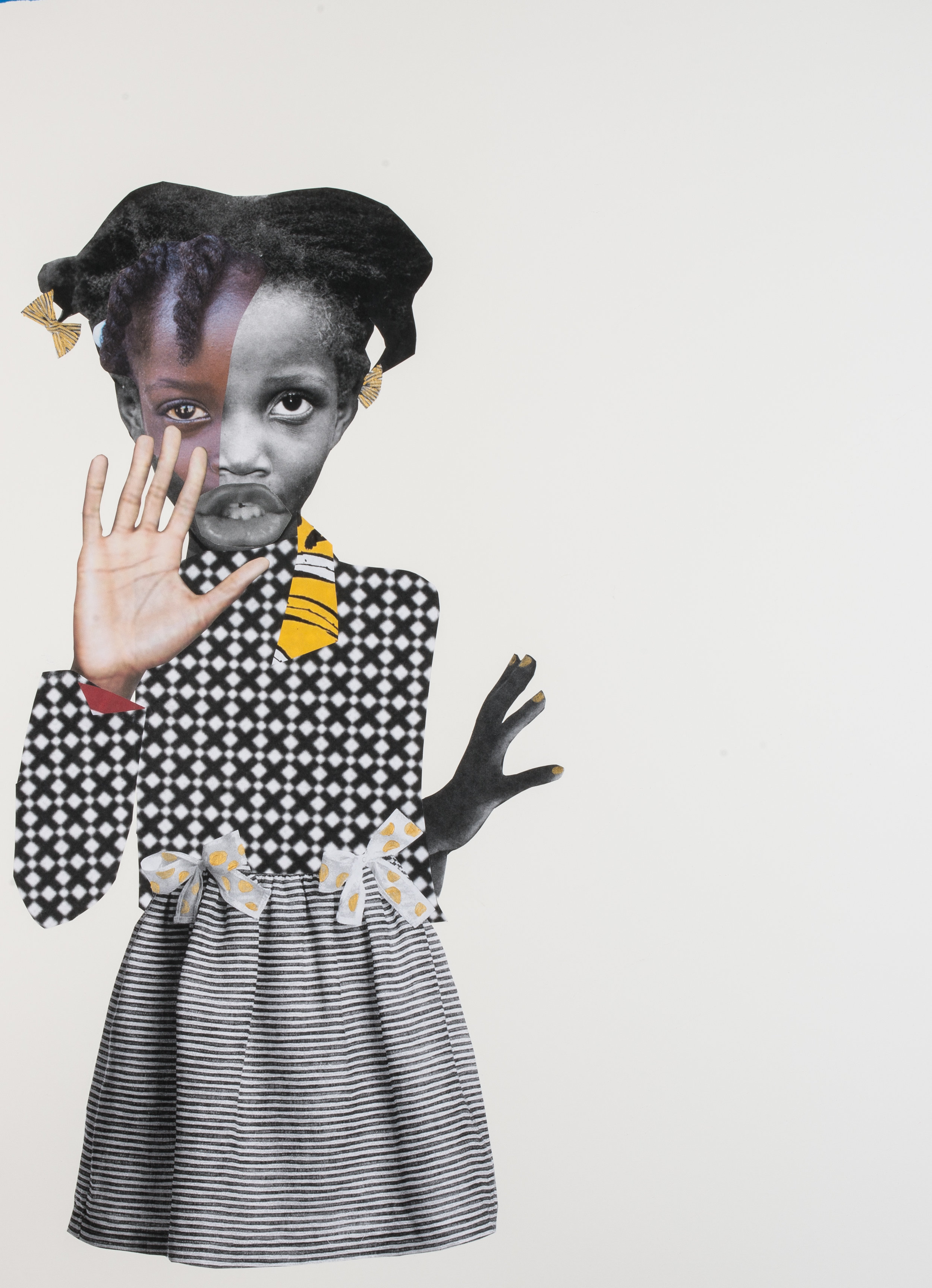In Conversation with Deborah Roberts: Iconic Art for Young Black and Brown Girls
An Act of Power, 58x38 ,2018. Courtesy of the artist.
Deborah Roberts brings girlhood, coming-of-age, and imposed beauty standards to the forefront in her collaged works. Recently seen in the Studio Museum in Harlem exhibition, Fictions, and currently on display at the Spelman College Museum of Fine Art, she taps into her own upbringing as it relates to the characters she portrays in her mixed-media narratives. She even partnered with The Cut to create works in collaboration with the Spring 2018 fashion collections in a recent issue of New York Magazine.
Behind the whim and forward fashion sense of her collaged characters, Roberts calls into question the ways in which Black girls come-of-age through the lens of mainstream beauty standards. In turn, creating poignant, reflective pieces addressing a timeless issue that affects many women and girls of color. Here she is, in conversation, to share a bit about her inspiration, process, and art-making practices.
Kimberly Henderson: Girlhood and socio-cultural beauty standards are just two of the conceptual aspects at play in your work. How has your childhood or coming-of-age experience informed these features in your work?
Deborah Roberts: I grew up in a house with three sisters and each of us had our own style, nothing too outrageous but none of us wanted to be dressed like the other one. By the time we were pre-teens we all had different styles. Each of us explored our own ideas of what was beautiful and fashionable, for me that was art.
Are the main characters in your work a direct reflection of yourself in any way? Do you see yourself existing through these collaged characters?
No. I think the early collages had a lot of me in them, in fact my first collages had my eight-year-old self in them. My work represents the idea of coming from the margins of society. It investigates the emotional pain young girls go through when they are told that being born with coarse hair, brown eyes, and thick lips makes their beauty second class. My work challenges this archaic notion and pushes a new aesthetic and agenda to the forefront.
"My work represents the idea of coming from the margins of society. It investigates the emotional pain young girls go through when they are told that being born with coarse hair, brown eyes, and thick lips makes their beauty second class."
Baby Girl, 30x22, 2017. Courtesy of the artist.
Tell us about your art-making practices; how do you source materials? When selecting, do you look for particular images to fit the narrative of a current work, or is it more organic, in that your selected collaged pieces are based on what visually inspires you?
I source material from found photos via the internet, books, and image archives. When I decide to do a collage I’m usually thinking about some social or political issue. I use inspiration to guide me through my image choice. For example, if I see a face that makes me smile or reminds me of our beauty then I will use that face. The work rails against the notion that black beauty is somehow substandard.
Your work is currently on view at the Spelman College Museum of Fine Art in an exhibition titled, The Evolution of Mimi. What was the inspiration and concept behind this exhibition; who is Mimi and what is her story?
The title is based on a combination of albums titles like Lauryn Hil's The Miseducation of Lauryn Hill and Mariah Carey’s The Emancipation of Mimi. The work I was doing spoke to the notion of being vulnerable and tenacious at the same time. Knowing you were speaking that truth. I created 250 collage works addressing this idea.
"My goal is that young Black girls see themselves in the work. I hope it reminds them that they are powerful and phenomenal people who deserve respect!"
The Unbothered, 30x22, 2017. Courtesy of the artist.
Drawing from a sense of mythology, combined with the idea of Black women “breaking through” barriers to achieve greater success, what’s next for the characters in your work?
My goal is that young Black girls see themselves in the work. I hope it reminds them that they are powerful and phenomenal people who deserve respect! To be unyielding, independent women capable of making mistakes and rising up from them. I want the work to dismantle archaic notions of beauty and push forward a new aesthetic and agenda
Are there any upcoming or future projects that you’d like to share?
Look for my work in London in June and at MASS MoCA 2019.
Follow Deborah Roberts on Instagram: @rdeborah191
Grillz Not on me 22x14, 2017. Courtesy of the artist.
Grillz, Don't pee on my head and tell me it's raining [fish], 22x14, 2017. Courtesy of the artist.






![Grillz, Don't pee on my head and tell me it's raining [fish], 22x14, 2017. Courtesy of the artist.](https://images.squarespace-cdn.com/content/v1/500825cf84aef6ab9cd1717b/1519490747874-19AMQY45NLQM67693FWP/DR.2017.072.ref+copy.jpg)




